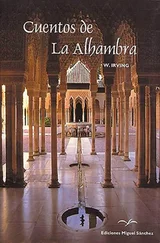But though a great part of Spain is deficient in the garniture of groves and forests, and the softer charms of ornamental cultivation, yet its scenery is noble in its severity, and in unison with the attributes of its people; and I think that I better understand the proud, hardy, frugal and abstemious Spaniard, his manly defiance of hardships, and contempt of effeminate indulgences, since I have seen the country he inhabits.
There is something too, in the sternly simple features of the Spanish landscape, that impresses on the soul a feeling of sublimity. The immense plains of the Castiles and of La Mancha, extending as far as the eye can reach, derive an interest from their very nakedness and immensity, and possess, in some degree, the solemn grandeur of the ocean. In ranging over these boundless wastes, the eye catches sight here and there of a straggling herd of cattle attended by a lonely herdsman, motionless as a statue, with his long slender pike tapering up like a lance into the air; or, beholds a long train of mules slowly moving along the waste like a train of camels in the desert; or, a single horseman, armed with blunderbuss and stiletto, and prowling over the plain. Thus the country, the habits, the very looks of the people, have something of the Arabian character. The general insecurity of the country is evinced in the universal use of weapons. The herdsman in the field, the shepherd in the plain, has his musket and his knife. The wealthy villager rarely ventures to the market-town without his trabuco, and, perhaps, a servant on foot with a blunderbuss on his shoulder; and the most petty journey is undertaken with the preparation of a warlike enterprise.
The dangers of the road produce also a mode of travelling, resembling, on a diminutive scale, the caravans of the east. The arrieros, or carriers, congregate in convoys, and set off in large and well-armed trains on appointed days; while additional travellers swell their number, and contribute to their strength. In this primitive way is the commerce of the country carried on. The muleteer is the general medium of traffic, and the legitimate traverser of the land, crossing the peninsula from the Pyrenees and the Asturias to the Alpuxarras, the Serrania de Ronda, and even to the gates of Gibraltar. He lives frugally and hardily: his alforjas of coarse cloth hold his scanty stock of provisions; a leathern bottle, hanging at his saddle-bow, contains wine or water, for a supply across barren mountains and thirsty plains; a mule-cloth spread upon the ground is his bed at night, and his pack-saddle his pillow. His low, but clean-limbed and sinewy form betokens strength; his complexion is dark and sunburnt; his eye resolute, but quiet in its expression, except when kindled by sudden emotion; his demeanor is frank, manly, and courteous, and he never passes you without a grave salutation: “Dios guarde a usted!” “Va usted con Dios, Caballero!” (“God guard you!” “God be with you, Cavalier!”)
As these men have often their whole fortune at stake upon the burden of their mules, they have their weapons at hand, slung to their saddles, and ready to be snatched out for desperate defence; but their united numbers render them secure against petty bands of marauders, and the solitary bandolero, armed to the teeth, and mounted on his Andalusian steed, hovers about them, like a pirate about a merchant convoy, without daring to assault.
The Spanish muleteer has an inexhaustible stock of songs and ballads, with which to beguile his incessant wayfaring. The airs are rude and simple, consisting of but few inflections. These he chants forth with a loud voice, and long, drawling cadence, seated sideways on his mule, who seems to listen with infinite gravity, and to keep time, with his paces, to the tune. The couplets thus chanted, are often old traditional romances about the Moors, or some legend of a saint, or some love-ditty; or, what is still more frequent, some ballad about a bold contrabandista, or hardy bandolero, for the smuggler and the robber are poetical heroes among the common people of Spain. Often, the song of the muleteer is composed at the instant, and relates to some local scene, or some incident of the journey. This talent of singing and improvising is frequent in Spain, and is said to have been inherited from the Moors. There is something wildly pleasing in listening to these ditties among the rude and lonely scenes they illustrate; accompanied, as they are, by the occasional jingle of the mule-bell.
It has a most picturesque effect also to meet a train of muleteers in some mountain-pass. First you hear the bells of the leading mules, breaking with their simple melody the stillness of the airy height; or, perhaps, the voice of the muleteer admonishing some tardy or wandering animal, or chanting, at the full stretch of his lungs, some traditionary ballad. At length you see the mules slowly winding along the cragged defile, sometimes descending precipitous cliffs, so as to present themselves in full relief against the sky, sometimes toiling up the deep arid chasms below you. As they approach, you descry their gay decorations of worsted stuffs, tassels, and saddle-cloths, while, as they pass by, the ever-ready trabuco, slung behind the packs and saddles, gives a hint of the insecurity of the road.
The ancient kingdom of Granada, into which we *were about to penetrate, is one of the most mountainous regions of Spain. Vast sierras, or chains of mountains, destitute of shrub or tree, and mottled with variegated marbles and granites, elevate their sunburnt summits against a deep-blue sky; yet in their rugged bosoms lie ingulfed verdant and fertile valleys, where the desert and the garden strive for mastery, and the very rock is, as it were, compelled to yield the fig, the orange, and the citron, and to blossom with the myrtle and the rose.
In the wild passes of these mountains the sight of walled towns and villages, built like eagles’ nests among the cliffs, and surrounded by Moorish battlements, or of ruined watchtowers perched on lofty peaks, carries the mind back to the chivalric days of Christian and Moslem warfare, and to the romantic struggle for the conquest of Granada. In traversing these lofty sierras the traveller is often obliged to alight, and lead his horse up and down the steep and jagged ascents and descents, resembling the broken steps of a staircase.
Sometimes the road winds along dizzy precipices, without parapet to guard him from the gulfs below, and then will plunge down steep, and dark, and dangerous declivities. Sometimes it struggles through rugged barrancos, or ravines, worn by winter torrents, the obscure path of the contrabandista; while, ever and anon, the ominous cross, the monument of robbery and murder, erected on a mound of stones at some lonely part of the road, admonishes the traveller that he is among the haunts of banditti, perhaps at that very moment under the eye of some lurking bandolero. Sometimes, in winding through the narrow valleys, he is startled by a hoarse bellowing, and beholds above him on some green fold of the mountain a herd of fierce Andalusian bulls, destined for the combat of the arena. I have felt, if I may so express it, an agreeable horror in thus contemplating, near at hand, these terrific animals, clothed with tremendous strength, and ranging their native pastures in untamed wildness, strangers almost to the face of man: they know no one but the solitary herdsman who attends upon them, and even he at times dares not venture to approach them. The low bellowing of these bulls, and their menacing aspect as they look down from their rocky height, give additional wildness to the savage scenery.
I have been betrayed unconsciously into a longer disquisition than I intended on the general features of Spanish travelling; but there is a romance about all the recollections of the Peninsula dear to the imagination.
Читать дальше












